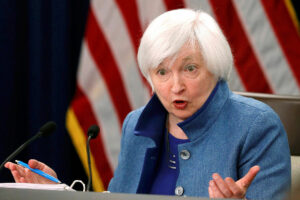US Treasury Secretary Janet Yellen sought to reassure jittery investors that American bank deposits were safe and promised policymakers had more firepower to battle any crisis even as bank stocks resumed their slide on Thursday.
Investors have dumped banking stocks globally over the past two weeks, with rapid interest rate hikes to rein in inflation blamed by some as the root cause of the debacle. US bank stocks slid again on Thursday, pushing the S&P 500 banks index down to its lowest close since November 2020.
US lender Silicon Valley Bank’s collapse over bond-related losses tied to a surge in interest rates was the initial trigger for the turmoil, and JPMorgan Chase & Co analysts estimate the “most vulnerable” US banks likely lost a total of about $1 trillion in deposits since last year. Half of the outflows occurred in March after SVB’s collapse, they said.
Policymakers have stressed the turmoil is different from the financial crisis 15 years ago, and Yellen repeated that she was prepared to take more action to protect bank deposits if needed – one of the issues investors are concerned about.
“As I have said, we have used important tools to act quickly to prevent contagion. And they are tools we could use again,” Ms. Yellen said in prepared remarks to the US House of Representatives Appropriations subcommittee hearing.
“The strong actions we have taken ensure that Americans’ deposits are safe. Certainly, we would be prepared to take additional actions if warranted.”
BOE HIKES AGAIN
In Europe, the Bank of England became the latest central bank to hike rates this week.
After its eleventh straight hike, the BoE said it had noted the “large and volatile moves” in financial markets, but that Britain’s banking system remained resilient.
“We have learnt a lot of lessons from the financial crisis. Of course, we keep learning lessons, but I’m confident that the banks in (Britain) are in a much stronger position,” BoE governor Andrew Bailey told broadcasters.
While some of the panic over the fate of banks has abated, investors are now adjusting to more challenging economic and lending conditions ahead.
The index of top European banks fell 2.5%, with German banking giants Deutsche Bank DBKGn.DE and Commerzbank falling 3.2% and 4.1%, respectively. London-headquartered HSBC dropped 2.9%.
US banking shares initially rose on Thursday with traders citing the Fed’s hints that it could soon pause further increases in borrowing costs as a source of some relief, but later turned negative.
Troubled US regional lender First Republic Bank, which is among banks speaking to peers and investment firms about potential deals, closed down 6%. About 90% of the bank’s stock market value has evaporated this month, leaving it with a market capitalization of just over $2 billion.
“Despite the strong efforts to protect, particularly First Republic, the crisis continues and investors are left wondering what is it that I’m not seeing,” said Rick Meckler, partner at Cherry Lane Investments in New Vernon, New Jersey.
Other U.S. banks under the microscope after the demise of SVB and Signature Bank added to recent losses. PacWest Bancorp, Comerica and Zion Bancorp each tumbled more than 8%.
Truist Securities cut its price targets on regional banks including Zions and Comerica, warning of slower growth and higher credit costs.
The S&P 500 banks index, which closed down 1.2%, has now fallen over 40% from its record high in February 2022.
BANK BOND PRESSURE
Earlier on Thursday, the Swiss National Bank raised its benchmark interest rate by 50 basis points and said the takeover of Credit Suisse – the biggest name ensnared by recent turmoil – by its Swiss rival UBS had averted a financial disaster.
To stop investor panic from spreading, the Swiss bank was rushed into the deal on Sunday with UBS Group AG, which along with Swiss authorities is racing to close the takeover within as little as a month, according to two sources with knowledge of the plans.
Spokespeople for UBS and Credit Suisse declined to comment.
“At this moment the focus has to be that we can maintain financial stability and that the closing of the deal is smooth and fast,” SNB Chair Thomas Jordan told a news conference.
Separately, Credit Suisse and UBS are under scrutiny in a US Department of Justice probe into whether financial professionals helped Russian oligarchs evade sanctions, Bloomberg News reported on Thursday.
The rescue of Credit Suisse has ignited broader concerns about investors’ exposure to a fragile banking sector. The decision to prioritise shareholders over Additional Tier 1 (AT1) bondholders rattled the $275 billion AT1 bond market and some Credit Suisse AT1 bondholders were seeking legal advice.
The convertible bonds were designed to be invoked during rescues to prevent the costs of bailouts falling onto taxpayers as it happened during the global financial crisis in 2008.
Politicians are also wary of public perceptions that banks are being bailed out again, after anger over the sector’s costly rescue in 2008. The US Senate Banking Committee called on the former chief executives of SVB and Signature Bank to testify as lawmakers weigh possible action.
Citizens Financial Group Inc. is working on a bid to acquire the private banking business of Silicon Valley Bank, two people familiar with the matter said. The FDIC, which now controls the Silicon Valley Bank assets, and Citizens Financial declined to comment. – Reuters

